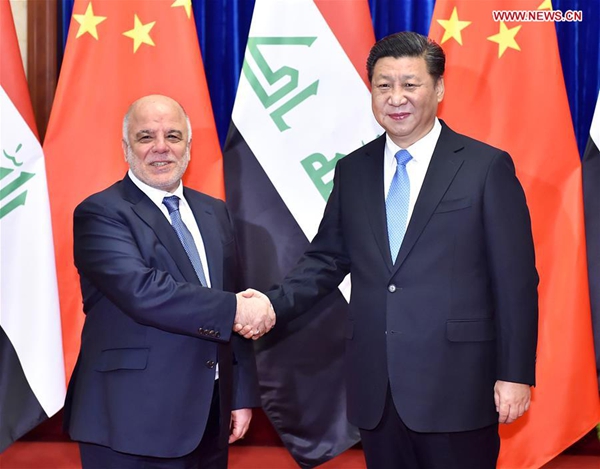What's behind Iraqi PM's China visit?
- By Zhang Jingwei
 0 Comment(s)
0 Comment(s) Print
Print E-mail China.org.cn, December 30, 2015
E-mail China.org.cn, December 30, 2015
|
|
|
Chinese President Xi Jinping (R) meets with Iraqi Prime Minister Haider al-Abadi in Beijing, capital of China, Dec. 22, 2015. [Xinhua/Li Tao] |
The Middle East is anything but peaceful. In addition to the notorious IS, the United States, Europe, Russia, as well as the opposing Sunni and Shiite Muslims have been locked in a turf war in the region. Recently, Turkey dispatched a fleet of armored troops to Iraqi borders in the name of training anti-terrorism forces, increasing tensions in the Gulf area. As a result,Iraq emerged as another headache adding to the mess of the region.
As the fruit of America's anti-terrorism war, the Iraqi administration has not met its patron's satisfaction. After the downfall of Saddam Hussein, the elected government did not follow America's rearranged "democratic path" with the Shiite forces taking power instead, thus drawing Iraq and Iran closer together.
To some extent, the U.S.-led Iraqi war did not accomplish President Bush's "Greater Middle East Partnership Initiative" and has instead thrown the region into further turmoil.
The recent Turkish military deployment into Iraq only ceased under U.S. pressure, a fact that demonstrates the enormous sway America wields in the region. The U.S. trusts Turkey more than Iraq not only in that the former belongs to the North Atlantic Treaty Organization (NATO) but also that the U.S. needs to use Turkey's air bases in its anti-terrorism campaign. Moreover, the al-Abadi administration has won little trust from the U.S. due to its Shiite domination.
From its fight against IS and its resistance to Turkey's "invasion," Iraq has adapted to a more diversified diplomatic policy. It has begun to shrug off its over-reliance on the U.S. and improve relations with Iran and Russia at the same time.
Recently, Iraq made another major diplomatic move by promoting its strategic relations with China during Prime Minister Haider al-Abadi's visit to the country on Dec. 22-23.




Go to Forum >>0 Comment(s)